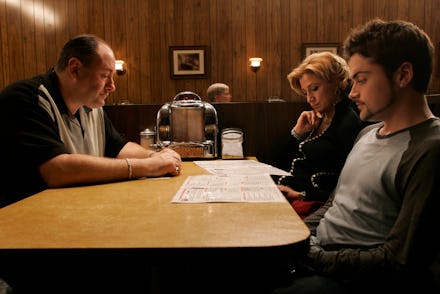Did Tony Soprano Die at the End of 'The Sopranos'? We Finally Have an Answer

In 2014, as TV fans grow wearier and wearier of the inevitable letdown of series finales, no one was expecting a follow-up on one of 21st century television's most unexpected, ambiguous conclusions: The Sopranos.
The 2007 ending cut to black spawned years of discussion and criticism and analysis and heartbreak: Did Tony Soprano die? Did Tony Soprano live?
After seven years of debate, who would have expected enigmatic auteur and creator David Chase to divulge the truth now? But he did. By doing so, Chase actually revealed The Sopranos finale to be more than just a great ending to an iconic show — it's also a lesson in understanding endings.
In an excellent 5,000 word profile via Vox — get ready for the big spoiler — Chase said Soprano does not die at the end of the series finale. When asked the question, "Is Tony dead?" by writer and film critic Martha P. Nochimson, Chase replied. "No. No he isn't." A simple answer with no follow-up.
Nochimson then breaks down the show's abrupt yet deathless end, casting it as the ultimate symbol of artistic modernism and an epoch of the work of multiple American and European artists over the last several decades.
"The art of closure forbids merely telling the audience in words that there is loss," Nochimson writes. "Chase's art seeks a silent level of knowing more profound than words. He believes we already know if we open up to that deeper part of us."
In other words: We don't need to be told what is happening. Coming to our own conclusions is not a televisual flaw it is a mark of audience and craft respect.
Aside from the truth about the cut to black, the profile hits home that the television viewer's hope for a neat, perfectly packaged series should not be a built in expectation; we should have learned that lesson seven years ago with The Sopranos.
This could not be more important for us to consider as we await the final segment of Chase protégé Matthew Weiner's Mad Men, a show with a writer who has already shown a merciless resentment for neat conclusions (Sal, anyone? Ginsberg, anyone?).
If we are to truly and completely appreciate the end of another astonishing piece of television, we must prepare for a potentially ambiguous ending, and not consider it a write-off if we don't get the conclusion many fans think they can presume.
Ambiguous endings are, of course, not without historic precedent. Fyodor Dostoevsky's Crime and Punishment ends ambiguously, as does Hedda Gabler. We could call the television version of this ambiguity just an extension of this literary technique.
The Sopranos did something we should have appreciated earlier: It built up and up and up, with huge audiences and loads of awards, and when it ended, it still left everyone thinking and talking.
It makes you wonder if TV shows of the last year might have been better had they followed its example. What if, for example, we never met the mother? What if we never learnt Vee's fate after escaping Litchfield? What if, instead of demanding the comprehensive, we are asked to analyze? Moving forward, let's extrapolate, discuss and appreciate the piece we were given, instead of moaning about the work we thought we deserved. That is the great legacy The Sopranos should be known for.